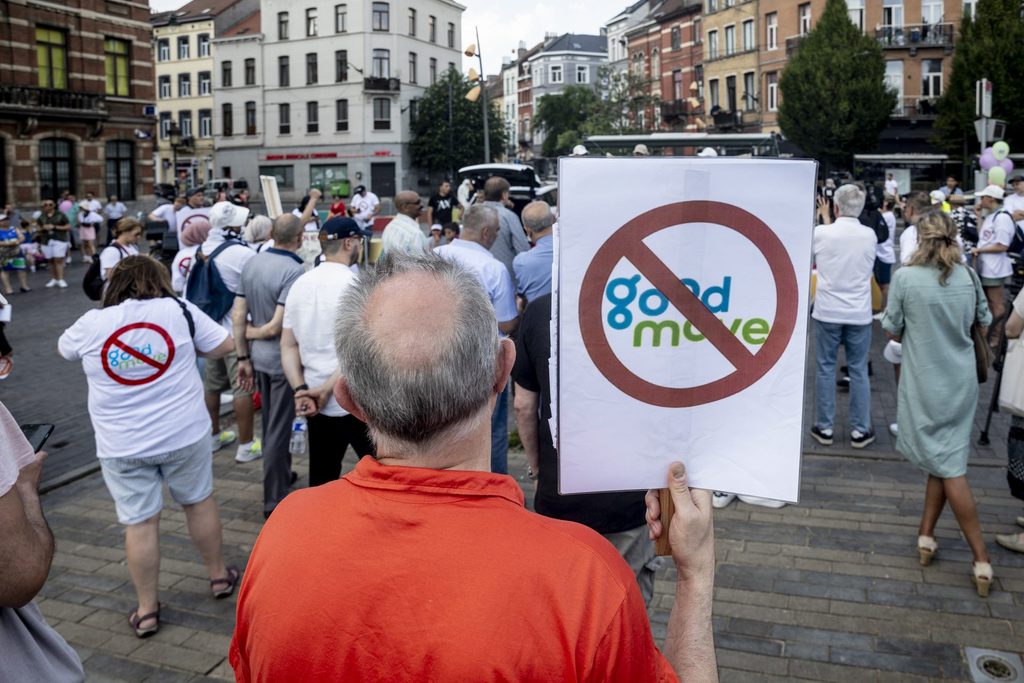Some 200 anti-Good Move protestors, coming from several Brussels municipalities, gathered on Sunday afternoon on the Place du Conseil in Anderlecht to call for the abolition of the new mobility plan of the Brussels-Capital Region.
The Good Move plan was put in place last August with the aim to make Brussels neighbourhoods largely car-free and give more space to pedestrians, cyclists and public transport. However, many are against the introduction of the new mobility plans.
"We are not against the environmental objectives of the Good Move plan and its ambitions to improve the quality of life of the inhabitants of the city," Cécile Vrignon of the 'No to Forest's Good Move plan' committee told Belga News Agency. "It is the method that we dispute."
When certain new traffic measures were introduced in Forest, closing neighbourhoods and eliminating several parking spaces, this greatly disrupted the lives of the inhabitants, she argued. "Some are no longer able to park while those living in the streets where traffic back is sent through are very impacted by noise and pollution."
Taboo move
One year before the elections, few Brussels municipalities want to embark on a new 'Good Move' plan, after a renewed call for applications was launched by the Region. Only one municipality applied and therefore won the subsidies: Berchem-Saint-Agathe.
The municipality wants to implement a traffic plan to the west of the Chaussée de Gand. "For two years, we will investigate the issue," said Berchem city councillor Thibault Wauthier, who has promised citizen participation in the process. Most other municipalities, however, are reluctant.
"The name 'Good Move' is now scary. It has become a taboo," a Brussels MP for Groen told the La Libre.

Young girl holds a sign saying "Good Move killed me" during the protest on Sunday. Credit: Belga / Hatim Kaghat
Good Move should have been in force in six Brussels municipalities by the end of last year: Anderlecht (Cureghem), Ixelles (Flagey-Étangs), Saint-Gilles, Jette (Dieleghem), City of Brussels and Schaerbeek (Colignon-Josaphat).
In Schaerbeek, City of Brussels and Ixelles, the circulation plan is currently (partly) in force, while an alternative mobility solution is being sought for the scrapped Good Move design in Cureghem. In Saint-Gilles and Ixelles, the plans were halted and had to be watered down by other traffic interventions.
Related News
- 'No Good Move philosophy': Uccle to implement its own mobility plan
- Schaerbeek's controversial Good Move plan has positive effect on public transport
- Brussels Government 'happy' with Good Move plan, despite protests
Most of the political reluctance is due to the strong reaction to the new traffic measures implemented in municipalities that have already rolled out (parts of) their Good Move plan: petitions, demonstrations and protests took place in Anderlecht as well as in Schaerbeek.
While the mobility plan should be rolled out in 11 districts by the elections next year, only the plan inside Brussels city centre (Pentagon/Vijfhoek) really holds water, even if the ones in Schaerbeek and Ixelles have been introduced but can count on a lot of opposition (despite proven positive effects).
By 2030, Brussels wants to reduce car use in a total of 50 residential areas, making them more liveable by introducing tailor-made Good Move mobility plans.

